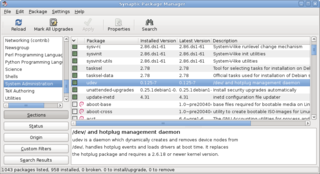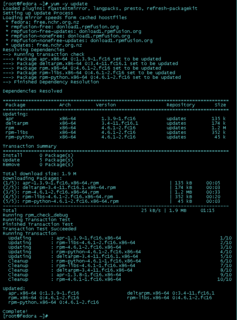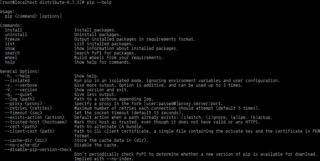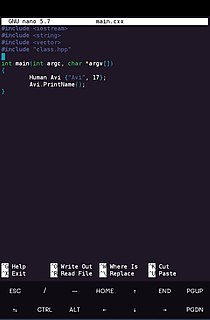The Comprehensive Perl Archive Network (CPAN) is a repository of over 250,000 software modules and accompanying documentation for 39,000 distributions, written in the Perl programming language by over 12,000 contributors. CPAN can denote either the archive network or the Perl program that acts as an interface to the network and as an automated software installer. Most software on CPAN is free and open source software.

A package manager or package-management system is a collection of software tools that automates the process of installing, upgrading, configuring, and removing computer programs for a computer in a consistent manner.

Advanced package tool, or APT, is a free-software user interface that works with core libraries to handle the installation and removal of software on Debian, and Debian-based Linux distributions. APT simplifies the process of managing software on Unix-like computer systems by automating the retrieval, configuration and installation of software packages, either from precompiled files or by compiling source code.

The Yellowdog Updater, Modified (YUM) is a free and open-source command-line package-management utility for computers running the Linux operating system using the RPM Package Manager. Though YUM has a command-line interface, several other tools provide graphical user interfaces to YUM functionality.

Portage is a package management system originally created for and used by Gentoo Linux and also by Chrome OS, Calculate, Sabayon, and Funtoo Linux among others. Portage is based on the concept of ports collections. Gentoo is sometimes referred to as a meta-distribution due to the extreme flexibility of Portage, which makes it operating-system-independent. The Gentoo/Alt project is concerned with using Portage to manage other operating systems, such as BSDs, macOS and Solaris. The most notable of these implementations is the Gentoo/FreeBSD project.

Synaptic is a GTK-based graphical user interface for the APT package manager used by the Debian Linux distribution and its derivatives. Synaptic is usually used on systems based on deb packages but can also be used on systems based on RPM packages. It can be used to install, remove and upgrade software packages and to add repositories.

eric is a free integrated development environment (IDE) used for computer programming. Since it is a full featured IDE, it provides by default all necessary tools needed for the writing of code and for the professional management of a software project.
Perl Package Manager (PPM) is a Perl utility intended to simplify the tasks of locating, installing, upgrading and removing software packages. It can determine if the most recent version of a software package is installed on a system, and can install or upgrade that package from a local or remote host.
A software repository, or repo for short, is a storage location for software packages. Often a table of contents is also stored, along with metadata. A software repository is typically managed by source control or repository managers. Package managers allow automatically installing and updating repositories.
Nix is a cross-platform package manager that utilizes a purely functional deployment model where software is installed into unique directories generated through cryptographic hashes. It is also the name of the tool's programming language. A package's hash takes into account the dependencies, which is claimed to eliminate dependency hell. This package management model advertises more reliable, reproducible, and portable packages.

The Python Package Index, abbreviated as PyPI and also known as the Cheese Shop, is the official third-party software repository for Python. It is analogous to the CPAN repository for Perl and to the CRAN repository for R. PyPI is run by the Python Software Foundation, a charity. Some package managers, including pip, use PyPI as the default source for packages and their dependencies.

Setuptools is a package development process library designed to facilitate packaging Python projects by enhancing the Python standard library distutils. It includes:

Package Installer for Python (pip) is the de facto and recommended package-management system written in Python and is used to install and manage software packages. It connects to an online repository of public packages, called the Python Package Index. pip can also be configured to connect to other package repositories, provided that they comply to Python Enhancement Proposal 503.
LuaRocks is a package manager for the Lua programming language that provides a standard format for distributing Lua modules, a tool designed to easily manage the installation of rocks, and a server for distributing them. While not included with the Lua distribution, it has been called the "de facto package manager for community-contributed Lua modules".

Astropy is a collection of software packages written in the Python programming language and designed for use in astronomy. The software is a single, free, core package for astronomical utilities due to the increasingly widespread usage of Python by astronomers, and to foster interoperability between various extant Python astronomy packages. Astropy is included in several large Python distributions; it is part of package managers for Linux and macOS, the Anaconda Python Distribution, Enthought Canopy and Ureka.
Anaconda is a distribution of the Python and R programming languages for scientific computing, that aims to simplify package management and deployment. The distribution includes data-science packages suitable for Windows, Linux, and macOS. It is developed and maintained by Anaconda, Inc., which was founded by Peter Wang and Travis Oliphant in 2012. As an Anaconda, Inc. product, it is also known as Anaconda Distribution or Anaconda Individual Edition, while other products from the company are Anaconda Team Edition and Anaconda Enterprise Edition, both of which are not free.
Conda is an open-source, cross-platform, language-agnostic package manager and environment management system. It was originally developed to solve difficult package management challenges faced by Python data scientists, and today is a popular package manager for Python and R. At first part of Anaconda Python distribution developed by Anaconda Inc., it ended up being useful on its own and for things other than Python, so it was spun out as a separate package, released under the BSD license. The Conda package and environment manager is included in all versions of Anaconda, Miniconda, and Anaconda Repository. Conda is a NumFOCUS affiliated project.

Termux is a free and open source terminal emulator for Android which allows for running a Linux environment on an Android device. In addition, various software can be installed through the application's package manager.










